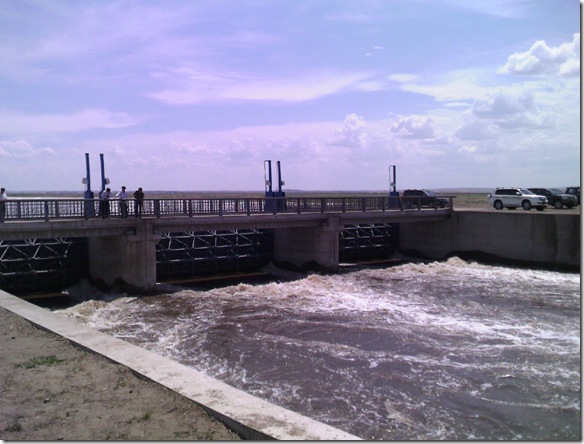The Argun River and its sources: Hailaer, Kherlen, Khalkh, rivers crossing the great Dauria Steppe are facing great threats. These rivers, which face severe impacts from climate change, are shared by China, Russia, and Mongolia, yet countries are over-using these water resources and failing to unite efforts to address environmental and water security challenges in these transboundary river basins.
The Hailaer/Argun River – Dalai(Hulun) Lake water diversion canal built in 2009 is a vivid example of nations’ desire to control transboundary waters within their territories with complete disregard for common sense and international interests. This canal is certain to trigger a dangerous pattern of environmental degradation among the remaining interconnected natural river basins in Dauria and Amur watershed. This is a very poorly known and rarely publicized problem that requires immediate attention from the world community.Unique biodiversity, unique ecosystems, and human communities are at great risk due to disruption of natural river flow.
In the Argun River basin he RwB Coalition pursues the following objectives:
– Use Hailer-Dalai water diversion project case-study to prevent implementation of other projects adding negative impacts on vulnerable wetlands of Argun River basin and elsewhere .
– Help Russia, China and Mongolia to cooperate on conservation and management of transboundary river basin, develop and implement environmental flow standards and other measures to safeguard wetland ecosystems.
– Promote international support for biodiversity conservation in globally important wetlands of Argun River Basin.
During 2009-2011 RwB organized and participated in the following activities:
Information collection, analysis and dissemination. The “Save Dauria Rivers!” website has been the first English-Russian-Chinese language media established by RwB Coalition and still contains most comprehensive information on Argun River issues and efforts to prevent the potentially disastrous impacts of the proposed water infrastructure projects in the transboundary Argun/Hailar River basin. English web-site has been updated until Dec.2011. Starting from January 1 2012, all new information is posted on transrivers.org .
Developing comprehensive reports on the problem and possible solutions and publicizing them through chapters in international assessments, media, scientific magazines , policy events, international fora, etc.
Initiating petitions and requests from various international, governmental, non-governmental organizations.
Consulting government authorities of Russia and assisting with framing terms of reference for research implemented on government requests. Participating in Sino-Russian negotiations as invited experts.
Identifying similar potential problems in other parts of the Argun River basin (Kherlen, Khalkh, Hui rivers, etc.) and conducting research and field visits to document them.
Supporting design and proper management of new wetland protected areas in the Argun River Basin.
Water management requires clear understanding of impacts of climate fluctuations and water requirements of ecosystems and species. To support informed climate adaptation policies in water management and river basin planning RwB became one of initiators of “Dauria Going Dry” pilot project under auspices of UNECE Convention for Transboundary Rivers and International Lakes.
By early 2012 the problem is relatively well documented and publicized, possible solutions on environmental flows and wetland protection formulated and brought to negotiation table, research and monitoring needs identified, work to fulfill those needs started. In 2011 Chinese side acknowledged possibility of negative impacts on downstream (transboundary) wetlands and declared first steps to mitigate them. There is a long way to go to solve the existing problem and prevent emergence of new ones.
We would like to thank core participants and main supporters of these efforts:
- Daursky Biosphere Reserve (Zabaikalye Region, Russia)
- Green Longjiang (Harbin, China)
- WWF Amur Branch and Amur Information Center (Vladivostok, Russia)
- the Magnificent Transbaikalia Project (Chita, Russia)
- Transparent World (Moscow, Russia)
- the Sosnovka Coalition of environmental nonprofit organizations of Siberia and the Russian Far East
- UNECE Transboundary Waters Convention Secretariat.
- Moscow State University, and others.


